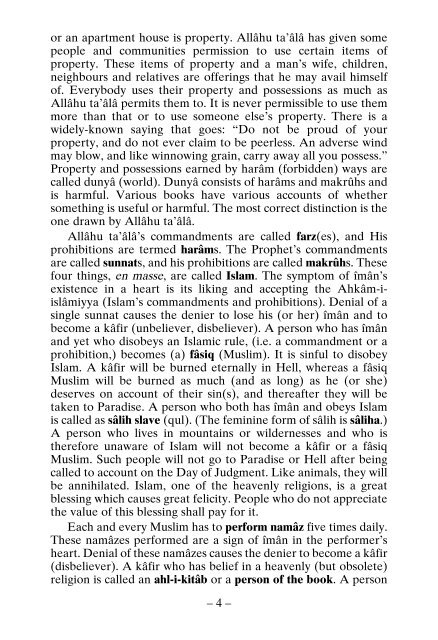The Sunni Path
THE SUNNI PATH The beginning of (The Sunni Path), the book by a statesman of the Ottoman Empire Ahmet Cevdet Pasha (Ma’lûmat-ı Nâfia=Beneficial Information), gives a succinct information about how to believe in the religion of Islam and makes the classification of the science of Islam. Imâm-ı Gazâli, one of the greatest savants of Islam, briefly explains the explanations of Ahl-i-sunnat savants of the true religion of Islam preached by Muhammad ׳alayhissalâm. In addition to this, the life of Imâm-ı A’zam Ebû Hanifa, a great Ahl-i-sunnat savant, is summarized in the book (The Sunni Path). Besides, given are an answer to the slanderers and an explanation to (How to be a True Muslim?)
THE SUNNI PATH
The beginning of (The Sunni Path), the book by a statesman of the Ottoman Empire Ahmet Cevdet Pasha (Ma’lûmat-ı Nâfia=Beneficial Information), gives a succinct information about how to believe in the religion of Islam and makes the classification of the science of Islam. Imâm-ı Gazâli, one of the greatest savants of Islam, briefly explains the explanations of Ahl-i-sunnat savants of the true religion of Islam preached by Muhammad ׳alayhissalâm. In addition to this, the life of Imâm-ı A’zam Ebû Hanifa, a great Ahl-i-sunnat savant, is summarized in the book (The Sunni Path). Besides, given are an answer to the slanderers and an explanation to (How to be a True Muslim?)
You also want an ePaper? Increase the reach of your titles
YUMPU automatically turns print PDFs into web optimized ePapers that Google loves.
or an apartment house is property. Allâhu ta’âlâ has given some<br />
people and communities permission to use certain items of<br />
property. <strong>The</strong>se items of property and a man’s wife, children,<br />
neighbours and relatives are offerings that he may avail himself<br />
of. Everybody uses their property and possessions as much as<br />
Allâhu ta’âlâ permits them to. It is never permissible to use them<br />
more than that or to use someone else’s property. <strong>The</strong>re is a<br />
widely-known saying that goes: “Do not be proud of your<br />
property, and do not ever claim to be peerless. An adverse wind<br />
may blow, and like winnowing grain, carry away all you possess.”<br />
Property and possessions earned by harâm (forbidden) ways are<br />
called dunyâ (world). Dunyâ consists of harâms and makrûhs and<br />
is harmful. Various books have various accounts of whether<br />
something is useful or harmful. <strong>The</strong> most correct distinction is the<br />
one drawn by Allâhu ta’âlâ.<br />
Allâhu ta’âlâ’s commandments are called farz(es), and His<br />
prohibitions are termed harâms. <strong>The</strong> Prophet’s commandments<br />
are called sunnats, and his prohibitions are called makrûhs. <strong>The</strong>se<br />
four things, en masse, are called Islam. <strong>The</strong> symptom of îmân’s<br />
existence in a heart is its liking and accepting the Ahkâm-iislâmiyya<br />
(Islam’s commandments and prohibitions). Denial of a<br />
single sunnat causes the denier to lose his (or her) îmân and to<br />
become a kâfir (unbeliever, disbeliever). A person who has îmân<br />
and yet who disobeys an Islamic rule, (i.e. a commandment or a<br />
prohibition,) becomes (a) fâsiq (Muslim). It is sinful to disobey<br />
Islam. A kâfir will be burned eternally in Hell, whereas a fâsiq<br />
Muslim will be burned as much (and as long) as he (or she)<br />
deserves on account of their sin(s), and thereafter they will be<br />
taken to Paradise. A person who both has îmân and obeys Islam<br />
is called as sâlih slave (qul). (<strong>The</strong> feminine form of sâlih is sâliha.)<br />
A person who lives in mountains or wildernesses and who is<br />
therefore unaware of Islam will not become a kâfir or a fâsiq<br />
Muslim. Such people will not go to Paradise or Hell after being<br />
called to account on the Day of Judgment. Like animals, they will<br />
be annihilated. Islam, one of the heavenly religions, is a great<br />
blessing which causes great felicity. People who do not appreciate<br />
the value of this blessing shall pay for it.<br />
Each and every Muslim has to perform namâz five times daily.<br />
<strong>The</strong>se namâzes performed are a sign of îmân in the performer’s<br />
heart. Denial of these namâzes causes the denier to become a kâfir<br />
(disbeliever). A kâfir who has belief in a heavenly (but obsolete)<br />
religion is called an ahl-i-kitâb or a person of the book. A person<br />
– 4 –

















